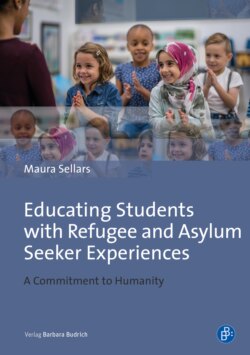Читать книгу Educating Students with Refugee and Asylum Seeker Experiences - Maura Sellars - Страница 22
На сайте Литреса книга снята с продажи.
[31] Conclusion
ОглавлениеThis discussion of power from a Foucauldian perspective served to illustrate the ways in which power operates, not only at levels of authority, but in the minutiae of everyday lives and interactions. It examines how power can be used in schools to mould and regulate individuals in the institutions, both students and staff, to accept and imitate the ‘norms’ of any society as ‘truth’ and the single, acceptable manner by which these ‘norms’ are maintained, despite their constant redefinition and renewal. It also presents the notion of ‘discourse’ as more than words and conceptual ideas and indicates how power relationships are demonstrated and reinforced in these communications. Importantly, it presents the symbiotic relationship between power and knowledge and the impact that may have on those with lesser power, their epistemological beliefs and their subsequent aspirations of success and acceptance as partners in decision making that pertains to their wellbeing. In developing his unique perspectives on aspects of societal development and on his interpretation of the operations of diverse forms of power, Foucault explains how societies have been woven together, often unconsciously and unsuspectingly, by their very participation and acceptance of societal expectations, and how this impacts on individuals or communities in societies who are ‘othered’ or seen as inferior. Many of the students with refugee and asylum seeker backgrounds are viewed as inferior in western educational institutions for a number of reasons, but essentially, this deficit perspective originates in the narrowness of the definitions of ‘knowledge’ determined by the powerful and the perceived lack of power possessed by those who have been ‘ascribed’ refugee and asylum seeker status.
It is certainly sensible to argue that this Foucauldian analysis of power as demonstrated in western societies and its institutions are inflicted on all students and not exclusively those with refugee or asylum seeker backgrounds. However, the responsibility of educating large numbers of students with backgrounds of loss, trauma, violence and dispossession in western educational systems has done nothing if not highlight the precarious state of schooling and its intractability with regards to procedural and regulatory regimes, use of administrative power to examine and exclude and narrowness of worldview. These students, amongst all the students who suffer from educational institutionalism and who do not feel they have sufficient power to challenge authority, deserve to be invested in, to be nurtured and to be provided with an education that reflects their own hope, courage and humanity. In order to achieve this, educational reforms that are authentic, far reaching and [32] cognisant of what is it to be human in the 21st century with core values of ‘love, life, wisdom and voice (Gidley, 2016) provide a way forward.
As Foucault identifies power as belonging to everyone and as pervading every aspect of life, despite the insidious nature of administrative power, the concerns of restructuring education should not only be directed to the decision-makers, the policymakers, the statisticians or the educators, but to all the participants in school communities and those who support them. As societies are increasingly micromanaged by structures of governmentality, the support systems that are available for these students and communities need not only to provide education that supports ‘Wisdom as waking up to multiplicity (Gidley, 2016 p.232)’, but one that celebrates, not stifles, human potential for complexity of thought and a fully integrated self (Gidley, 2008). For societies who accept students of refugee and asylum seeker students and their communities, new ‘norms’ need to emerge, most especially those in relation to epistemologies and ontologies; ‘norms’ that challenge the core of neoliberal thought and practice.
